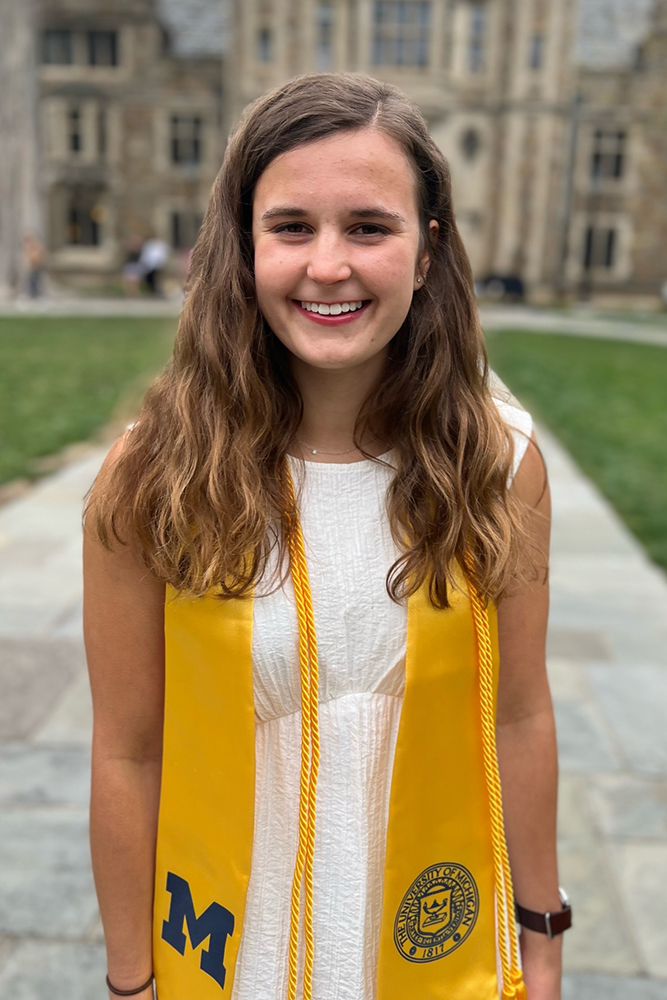Olivia Lee awarded NSF Graduate Research Fellowship for brain-machine interfaces that could improve control of robotic prostheses

What if we could control technology with our minds? For ECE PhD student Olivia Lee, it could mean greater movement abilities and improved independence for those using robotic prosthetic limbs.
“I want to create devices and systems that can restore movement to people who have been paralyzed or have lost limbs,” Lee said. “The goal is to create equitably accessible and clinically viable medical solutions to improve people’s health and well-being.”
Lee, an incoming ECE PhD student this fall who completed her bachelor’s degree in Electrical Engineering from U-M this spring, was selected for the National Science Foundation Graduate Research Fellowship Program (GRFP). The GRFP recognizes and supports outstanding graduate students in NSF-supported science, technology, engineering, and mathematics disciplines.
Lee works with Biomedical Engineering Prof. Cynthia Chestek (who is also a courtesy professor in ECE) and David Blaauw, the Kensall D. Wise Collegiate Professor of Electrical Engineering and Computer Science, on implantable and wearable electronics that can be directly controlled by a person’s brain.
“‘Brain-computer interfaces’ or ‘brain-machine interfaces,’ is when technology directly interfaces with the brain and the nervous system,” Lee said. “In my PhD, I want to explore this intersection through circuit design and machine learning.”
The goal is to create equitably accessible and clinically viable medical solutions to improve people’s health and well-being.
Olivia Lee, ECE PhD student
Lee originally planned to study Mechanical Engineering in her undergrad and pursue a career in the automotive industry, but she was drawn to physics and electromagnetics. She enjoyed the variety of Electrical Engineering classes, as well as the freedom in the program to take upper level electives. In her junior year, Lee began working with Chestek in her Cortical Neural Prosthetics Lab (CNPL).
“I’m so grateful to all the professors and my lab mates who helped me along the way, especially Cindy [Chestek],” Lee said. “She’s been a great role model and mentor, especially as a woman in STEM.”
The CNPL group works to design circuits, algorithms, and electrodes that can interpret neural signals and then send commands to the desired technology. They also use functional electrical stimulation and assistive exoskeletons to enable individuals to control prosthetic limbs.
“It is amazing to see how technology can impact people’s lives,” Lee said. “Knowing I could possibly help people regain movement and independence was one of the main reasons that I decided to go to grad school.”
Knowing I could possibly help people regain movement and independence was one of the main reasons that I decided to go to grad school.
Olivia Lee, ECE PhD student
As a grad student, Lee will be also working in the Blaauw lab on research regarding neural interface probes. These implantable neural recording systems could help restore limb function for paralyzed and severely injured individuals. Blaauw’s probes are so small they can operate for a long time without scarring the brain tissue itself. The goal is to combine hundreds to thousands of these probes to realize “neural recording dust” for the first time. Neural dust refers to a type of brain-computer interface where nanometer-sized devices are deployed to operate as wirelessly powered nerve sensors.
“Prof. Blaauw has so much expertise in chip design and circuitry,” Lee said. “I am very excited to be teamed up with both him and Prof. Chestek.”
Lee has always been passionate about physical activity, and she enjoys power lifting, running, hiking, skiing, and playing soccer. She’s run a few marathons, including the Ann Arbor marathon last October. She plans to compete in triathlons next, including the ultimate triathlon — an Ironman race.
“I care a lot about how healing and powerful movement can be,” Lee said. “It’s not something I take for granted.”
In addition to being inspired by Chestek and the CNPL group, Khalil Najafi, the Schlumberger Professor of Engineering and Arthur F. Thurnau Professor, specifically encouraged Lee to continue on as a PhD student.
“Last fall, Prof. Najafi asked me if I had seriously considered grad school,” Lee said. “And I was like, ‘Nope!’ And he said, ‘Well, you should think about it.’ And I did. And here we are.”
 MENU
MENU 
